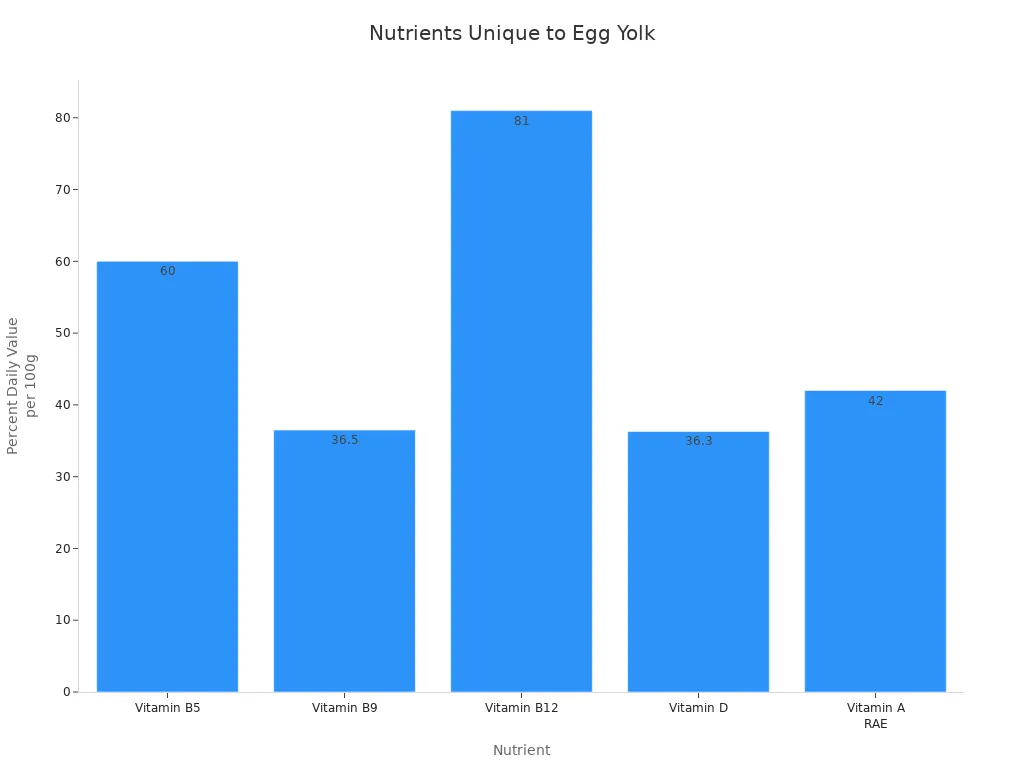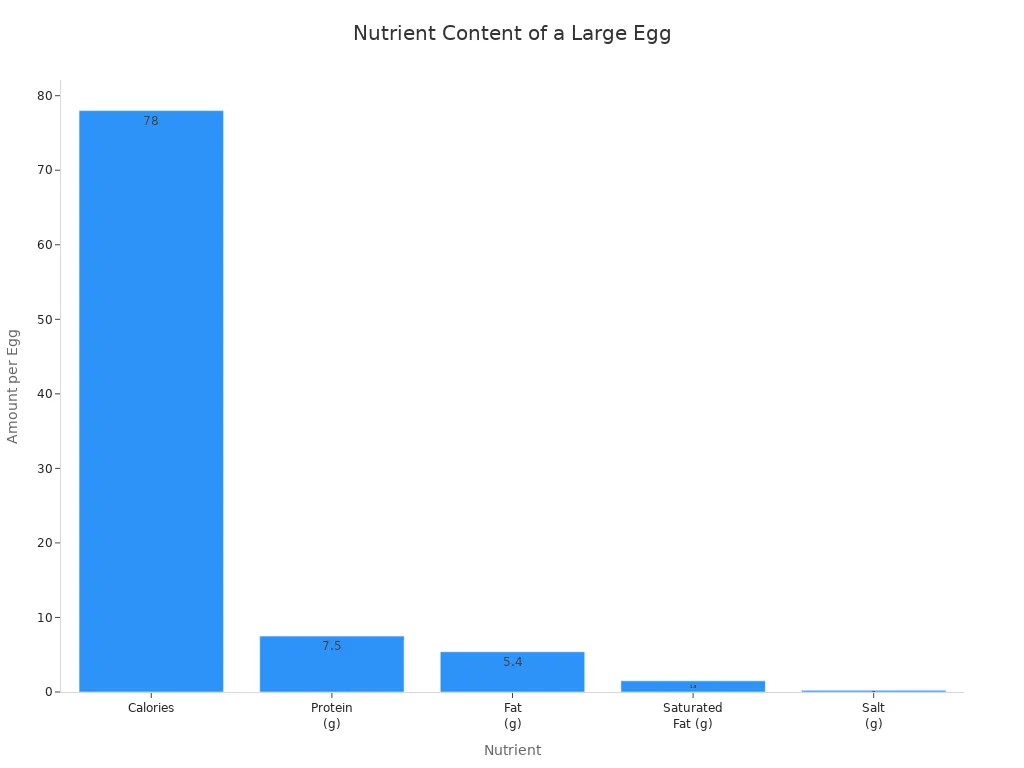
You may wonder if eating eggs raises your cholesterol or increases your risk of heart disease. Recent studies show that moderate egg consumption does not significantly impact cardiovascular health for most people. Take a look at what large-scale research reports:
Study | Findings |
|---|---|
Liu et al., 2020 | Medium or high egg consumption (>26.79 g/d) associated with higher HDL-C levels. |
Khalighi Sikaroudi et al., 2020 | Non-linear effect for VLDL-C, showing inverse association at <1.5 eggs/day. |
Lifetime Risk Pooling Project | Positive association between egg consumption and cardiovascular disease risk; each additional 0.5 egg/day increased risk. |
European Prospective Investigation into Cancer and Nutrition | Each additional 20 g of egg/day associated with 7% lower risk of coronary heart disease, but not significant after 4 years. |
China Kadoorie Biobank | Higher egg consumption linked to lower incidence of cardiovascular disease compared to non-consumers. |
Many adults feel concerned about cholesterol in eggs.
10.2% of adults limit eggs because of cholesterol worries.
25.5% avoid eggs for multiple reasons, including doctor advice about high cholesterol.
You can feel confident choosing eggs as part of your diet. Cholesterol in Eggs does not affect everyone the same way, and most people can enjoy eggs without raising their health risks.
Key Takeaways
Moderate egg consumption does not significantly raise cholesterol levels for most people. Enjoying eggs can be part of a healthy diet.
Egg yolks contain essential nutrients like vitamins and healthy fats. Don’t skip the yolk to get the full benefits of eggs.
Saturated fat in your overall diet has a bigger impact on cholesterol levels than the cholesterol from eggs. Focus on a balanced diet.
Most health organizations now agree that healthy adults can safely eat one egg per day without increasing heart disease risk.
If you have diabetes or high cholesterol, consult your doctor about your egg intake to ensure it fits your health needs.
Cholesterol in Eggs

How Cholesterol in Eggs Affects the Body
You might wonder what happens when you eat eggs and how cholesterol in eggs affects your body. A typical large egg contains about 186 mg of cholesterol. You will find almost all of this cholesterol in the yolk. The egg white does not have any cholesterol at all.
A large egg has about 186 mg of cholesterol.
The yolk contains all the cholesterol.
Egg whites are cholesterol-free.
When you eat eggs, your body does not absorb all the cholesterol in eggs. Several factors help control how much cholesterol enters your bloodstream. The table below shows some of the main ways your body manages cholesterol from eggs:
Mechanism | Description |
|---|---|
Phospholipids | Change how your cells absorb cholesterol and help regulate transport proteins. |
Gut Microbiota | Affect how your body processes and absorbs cholesterol. |
Regulatory Systems | Keep your cholesterol levels balanced. |
Your body absorbs only a limited amount of cholesterol from whole eggs. Phosphatidylcholine and sphingomyelin, which are found in the yolk, can lower cholesterol absorption. Egg white protein also helps by making cholesterol less soluble in your gut. Because of these natural controls, eating eggs does not always lead to higher cholesterol in your blood.
Research shows that eating whole eggs does not significantly raise your total cholesterol. Your body adjusts by making less cholesterol when you eat more from food. This means that for most people, cholesterol in eggs does not cause high cholesterol.
Research on Cholesterol in Eggs
Many studies have looked at how egg consumption affects cholesterol levels. Most healthy adults do not see a big change in their cholesterol after eating eggs. In fact, eating eggs can even improve your cholesterol profile. The table below shows what happens to LDL (bad) and HDL (good) cholesterol when you eat more eggs:
Finding | Description |
|---|---|
LDL Cholesterol | Higher egg intake links to lower LDL cholesterol levels. |
HDL Cholesterol | Higher egg intake links to higher HDL cholesterol levels. |
LDL/HDL Ratio | The ratio improves, which is good for your heart. |
You may also see an increase in large LDL and HDL particles, which are less likely to cause heart problems. Plasma apoAI, a protein that helps remove cholesterol from your blood, also goes up with more egg consumption.
Most people do not need to worry about cholesterol in eggs. However, a small group called “hyper responders” reacts differently. If you are a hyper responder, your cholesterol may rise a little when you eat eggs. The National Lipid Association suggests that people with high cholesterol or those who are hyper responders should limit dietary cholesterol.
In 2015, the Dietary Guidelines for Americans changed their advice about cholesterol. They no longer set a daily limit for cholesterol intake. This change happened because research showed that dietary cholesterol does not have a strong effect on blood cholesterol. Eggs are now seen as a healthy food that gives you protein and other nutrients.
Today, most health organizations agree that you can include eggs in your diet. You do not need to avoid eggs if you are healthy. Canadian health groups also say that healthy adults do not need to limit egg consumption. If you have high cholesterol or other health concerns, talk to your doctor about how many eggs are right for you.
Tip: If you are healthy, you can enjoy eggs as part of a balanced diet. If you have high cholesterol or are a hyper responder, check with your doctor before making changes.
Eggs and Heart Health
Eggs and Blood Cholesterol
You may hear that eggs can affect your blood cholesterol levels. Many people worry about this when thinking about heart health. When you eat eggs, you add cholesterol to your diet, but the effect on your blood cholesterol levels depends on what else you eat. The saturated fat in your meals has a bigger impact on your cholesterol than the cholesterol from eggs.
The impact of egg consumption on LDL cholesterol levels depends more on the saturated fat in your overall diet than on the cholesterol in eggs.
Eating eggs as part of a low-saturated fat diet can help lower LDL cholesterol levels. This may reduce your risk of cardiovascular problems.
The way eggs affect your cholesterol can change based on your starting cholesterol levels and what you eat with your eggs.
If you eat two eggs a day as part of a diet low in saturated fat, you may see lower LDL cholesterol concentrations. This change can mean fewer large LDL particles and more small LDL particles. The relationship between eggs and cholesterol is complex, but you can manage your blood cholesterol levels by focusing on your whole diet.
A study compared the saturated fat in eggs to other breakfast foods. The results showed no major differences in how your body handles sugar after eating these foods. Most of the saturated fat in breakfast comes from butter, which may not harm your blood sugar control. This means that the saturated fat in eggs does not seem to hurt your heart health when you eat them as part of a typical breakfast.
Eggs and Heart Disease Risk
You may wonder if eating eggs increases your heart disease risk. Many studies have looked at this question. Large cohort studies in the United States show no significant link between regular egg consumption and higher rates of heart attacks or coronary heart disease. The risk for one egg per day is almost the same as not eating eggs at all. In some Asian countries, people who eat more eggs may even have a lower risk of cardiovascular diseases. This difference may come from other parts of their diet or lifestyle.
Most people can eat eggs without raising their risk of cardiovascular diseases. However, some groups need to be careful. If you have diabetes or obesity, eating five or more eggs each week may increase your risk of cardiovascular diseases by about 10%. People who eat more than 250 mg of cholesterol daily may also see a higher risk. You should talk to your doctor if you have these conditions.
Note: For most people, eggs do not raise heart disease risk. If you have diabetes or high cholesterol, check with your doctor about how many eggs are safe for you.
Egg consumption fits into a healthy diet for most people. You can enjoy eggs while keeping your heart health in mind. Focus on your whole diet, especially the amount of saturated fat, to help control your cholesterol and lower your risk of cardiovascular problems.
Myths About Eggs
Myth: Eggs Raise Cholesterol
You often hear that eating eggs will raise your cholesterol. This idea has led many people to avoid eggs. What do studies show? Most research finds no direct link between egg consumption and higher cholesterol levels in your blood. About 75% of people see little or no change in their cholesterol after eating eggs. Only a small group, called hyper-responders, may notice a slight increase.
Here is what scientists have found:
Evidence Description | Findings |
|---|---|
Studies on dietary cholesterol and blood cholesterol levels | Many studies have not found a direct correlation between dietary cholesterol from eggs and increased cholesterol levels in the blood. |
Population response to dietary cholesterol | Approximately 75% of the population exhibit moderate to minimal changes in their plasma cholesterol levels when consuming dietary cholesterol. |
Meta-analyses on egg yolk consumption | No conclusive link established between coronary artery disease and egg yolk consumption. |
Impact of egg yolks on atherosclerosis | Eating two to three eggs a day did not significantly change baseline TMAO levels, while supplements increased TMAO levels. |
You can see that the myth does not match the facts. Eating eggs does not usually cause a big jump in cholesterol for most people.
Myth: Eggs Harm Heart Health
Many people believe that eggs are bad for your heart. What does the science say? The American Heart Association now says you can safely eat one egg per day. Older adults with healthy cholesterol levels can have two. Recent studies show no link between egg consumption and heart disease for healthy people. In one study, older adults with heart risk factors ate twelve eggs a week. Their cholesterol did not go up.
Eggs have been a staple in diets for years. Research shows that other foods, like processed snacks, may be more harmful to your heart than eggs.
Myth: Only Egg Whites Are Safe
Some people think you should eat only egg whites. What do you miss if you skip the yolk? Egg yolks have many nutrients that egg whites do not. You get vitamins B5, B9, B12, D, A, E, and K from the yolk. The yolk also gives you healthy fats and minerals like selenium, phosphorus, and iodine.
Nutrient | Egg Yolk (per 100g) | Egg White (per 100g) |
|---|---|---|
Vitamin B2 | 40% | 33% |
Vitamin B5 | 60% | N/A |
Vitamin B9 | 36.5% | N/A |
Vitamin B12 | 81% | N/A |
Vitamin D | 36.3% | N/A |
Vitamin A RAE | 42% | N/A |
Vitamin E | Present | N/A |
Vitamin K | Present | N/A |
Fats | 26.54g | Negligible |
Selenium | Present | Lower concentration |
Phosphorus | Present | Lower concentration |
Iodine | Present | Lower concentration |

Egg consumption that includes the yolk gives you more nutrition. You do not need to avoid the yolk unless your doctor tells you to.
You can enjoy eggs as part of a healthy diet. Do not let myths keep you from getting the benefits of eggs.
Egg Nutrition Facts

Nutritional Benefits
You get many nutrients from eggs. One large egg gives you high-quality protein, healthy fats, and important vitamins and minerals. Eggs are a complete source of protein because they have all nine essential amino acids. You also get choline, which supports your brain and nervous system. Selenium, vitamin B12, and vitamin D help your body work well every day.
Here is a table showing what you get from a large egg (68 grams):
Nutrient | Per Large Egg (68 grams) |
|---|---|
Calories | 78 |
Protein (g) | 7.5 |
Fat (g) | 5.4 |
Saturated Fat (g) | 1.5 |
Carbohydrates (g) | trace |
Sugars (g) | trace |
Salt (g) | 0.23 |
Choline | 31% of DV |
Selenium | 28% of DV |
Vitamin B12 | 21% of DV |
Vitamin D | 6% of DV |
Vitamin B2 | 16% of DV |
Iron | 5% of DV |

You find most vitamins and minerals in the yolk. The yolk also has 2.4 grams of protein and 4.5 grams of fat. The egg white gives you extra protein with almost no fat. Eggs help you feel full and support muscle growth. Many people choose eggs for breakfast because they are a reliable source of protein.
Eggs give you vitamin B2, vitamin B12, vitamin D, selenium, iodine, choline, and antioxidants like lutein and zeaxanthin. These nutrients support your eyes, brain, and immune system.
Eggs in a Balanced Diet
Egg consumption fits well into a healthy eating plan. You can eat eggs several times a week. Most guidelines suggest one egg per day, averaged over the week, for healthy adults. Eggs are nutrient-dense and low in saturated fat, so they support heart health when you eat them in moderation.
Recommended serving size is one egg.
You can enjoy two to four eggs per week as part of a balanced diet.
For children and older adults, eggs help meet protein and nutrient needs.
The World Health Organization recommends eggs for infants and young children to support growth.
Eggs work well with vegetables, whole grains, and lean meats. You can add eggs to salads, sandwiches, or stir-fries. If you want to manage cholesterol, try to limit foods high in saturated fat when you eat eggs. Dietary cholesterol from eggs does not affect most people’s blood cholesterol, but moderation is still best.
Tip: Choose boiled, poached, or scrambled eggs with little added fat for the most health benefits of eggs.
Special Considerations
People with Diabetes
If you have diabetes, you may wonder what daily egg intake is safe for you. Research shows that eating more eggs can increase cardiovascular risk in people with type 2 diabetes. The following table highlights findings from several studies:
Study | Population | Egg Consumption | CVD Risk | Relative Risk (RR) | Confidence Interval (CI) |
|---|---|---|---|---|---|
Hu et al. | T2DM patients | ≥1 egg/day | Higher | 2.02 | 1.05–3.87 |
Health, Aging, and Body Composition study | Elderly T2DM patients | ≥3 eggs/week | Higher | 5.02 | 1.63–15.51 |
You should know that some studies suggest a positive association between higher egg consumption and cardiovascular risk, even after adjusting for diabetes and cholesterol levels. However, other research finds that eating up to 7 eggs per week does not significantly affect cholesterol or diabetes risk markers if you follow a healthy lifestyle. Experts recommend that you include eggs as part of a balanced diet with vegetables, fruits, whole grains, and healthy fats. Moderate egg intake may help you manage blood glucose and reduce complications.
Tip: If you have diabetes, talk to your doctor about your egg intake. Choose eggs as part of a nutritious meal plan.
Children and Older Adults
Eggs offer many benefits for children and seniors. You get high-quality protein and essential nutrients like folate, iodine, choline, and vitamin D. These nutrients support muscle strength and brain health. The table below shows some findings about eggs and health in these groups:
Benefit/Risk | Description |
|---|---|
Nutritional Benefits | Eggs support muscle maintenance and cognitive health in older adults. |
Risk of High Consumption | High egg intake may raise cholesterol and diabetes risk. More research is needed. |
Nutrient Density | Eggs improve intake of key nutrients for children and seniors. |
Studies show that eating eggs may lower the risk of Alzheimer’s dementia in older adults. You get choline and DHA, which help your brain. For children, eggs help growth and development. You should avoid very high egg consumption, as some research links it to higher cancer mortality. Most experts agree that moderate egg intake is safe and beneficial.
Note: Eggs are a nutritious choice for most children and older adults. Include them in a balanced diet for best results.
You can enjoy eating eggs every day as part of a heart-healthy diet. Research shows that two eggs a day do not raise LDL cholesterol when you keep saturated fat low. Focus on what you eat with your eggs—vegetables and whole grains make great choices. Try these tips:
Add eggs to salads or whole grain toast.
Make veggie omelets or egg muffins for quick meals.
Choose hard-boiled, poached, or scrambled eggs for easy, healthy options.
Remember, one egg a day fits well into most healthy eating patterns.
FAQ
What is the recommended number of eggs you can eat each week?
Most healthy adults can eat one egg per day, or about seven eggs per week. You should talk to your doctor if you have diabetes or high cholesterol.
Tip: Eating eggs in moderation fits well into a balanced diet.
What nutrients do you get from eating eggs?
Eggs give you protein, choline, vitamin B12, vitamin D, selenium, and antioxidants. You find most nutrients in the yolk. The egg white gives you extra protein with almost no fat.
Nutrient | Found in Egg |
|---|---|
Protein | Yes |
Choline | Yes |
Vitamin D | Yes |
What happens if you only eat egg whites?
You get protein but miss out on vitamins and healthy fats found in the yolk. Egg whites do not have cholesterol. You lose nutrients like vitamin D, choline, and vitamin B12.
What should you do if you have high cholesterol?
You should limit foods high in saturated fat. You can eat eggs in moderation. Ask your doctor how many eggs are safe for you.
Note: Your doctor can help you make the best choice for your health.
What is the best way to cook eggs for heart health?
Boil, poach, or scramble eggs with little added fat. Avoid frying eggs in butter or oil. Pair eggs with vegetables or whole grains for a healthy meal.
Boiled eggs
Poached eggs
Scrambled eggs with vegetables


